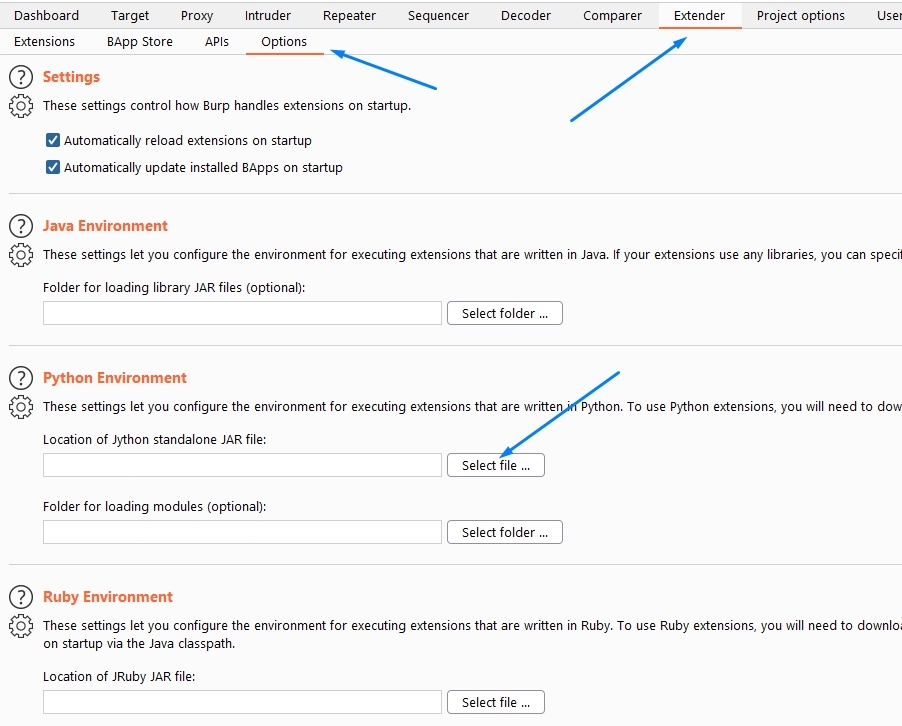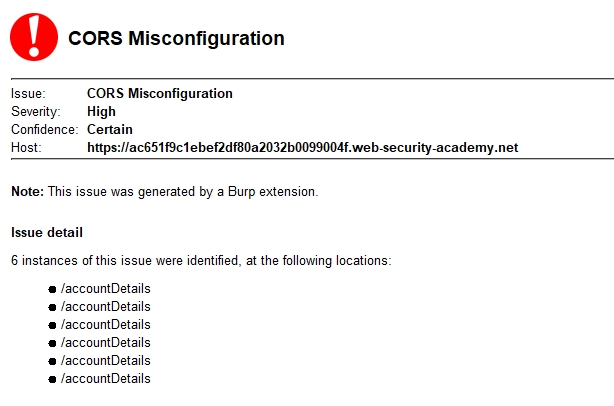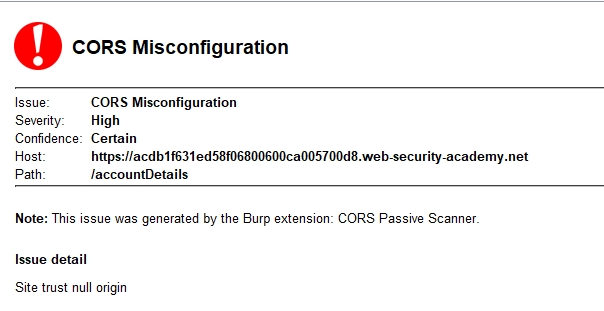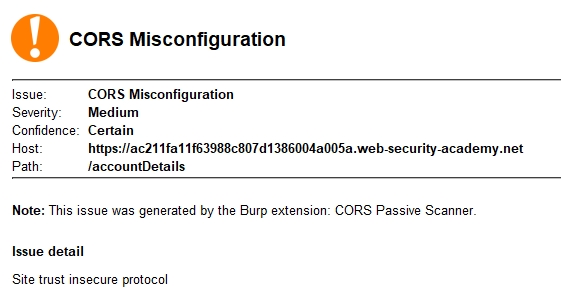
こんにちは、Habr!
PortSwiggerのBurpSuiteのようなツールについては多くの人が知っていると思います。Burp Suiteは、人気のあるWebアプリケーションセキュリティ監査プラットフォームです。Burpにはすでにたくさんの便利な機能が含まれているという事実に加えて、ユーザーはアプリケーションの組み込み機能を信じられないほど増やすことができる独自の拡張機能を作成することもできます。
, Python , , , Burp Java, , , Java. , , Bug Bounty. Burp Suite Python, CORS misconfiguration.
, Burp Java, Python Jython Standalone Edition, PortSwigger. Burp Extender - Options - Python environment Jython .

Burp , burp-exceptions. , Java:
Java
java.lang.RuntimeException: org.python.core.PyException
at burp.fl.a(Unknown Source)
at burp.edd.a(Unknown Source)
at burp.e2g.a(Unknown Source)
at burp.e2g.g(Unknown Source)
at burp.i1c.stateChanged(Unknown Source)
at javax.swing.JTabbedPane.fireStateChanged(JTabbedPane.java:416)
at javax.swing.JTabbedPane$ModelListener.stateChanged(JTabbedPane.java:270)
...
Python, Java, . Java Python :
Python
*** PYTHON EXCEPTION
Traceback (most recent call last):
File "/Users/mb/Desktop/burp extension/exceptions_fix.py", line 8, in decorated_function
return original_function(*args, **kwargs)
File "/Users/mb/Desktop/burp extension/CustomEditorTab.py", line 78, in setMessage
self._txtInput.setEsditable(self._editable)
AttributeError: 'burp.ul' object has no attribute 'setEsditable'
, .
:
Burp, Extender - Options - Python environment. , , Folder for loading modules.
-
,
, CORS . .
Python . , , cors-scanner.py.
try:
from exceptions_fix import FixBurpExceptions
except ImportError:
pass
burp
,
from burp import IBurpExtender, IScannerCheck, IScanIssue
from java.io import PrintWriter
import sys
:
try:
FixBurpExceptions()
except:
pass
,
BurpExtender
- . , activeScan++, Python. , .
:
class BurpExtender(IBurpExtender, IScannerCheck):
IBurpExtender - , Burp.
IScannerCheck - , / , .
def registerExtenderCallbacks(self, callbacks):
sys.stdout = PrintWriter(callbacks.getStdout(), True)
self._callbacks = callbacks
self._helpers = callbacks.getHelpers()
callbacks.setExtensionName('CORS Passive Scanner')
callbacks.registerScannerCheck(self)
, .
callbacks.registerScannerCheck(self)
-, registerScannerCheck(..)
. - self
.
,
def doPassiveScan(self, baseRequestResponse):
baseRequestResponse - , , .
: CORS misconfiguration? - . :
Access-Control-Allow-Origin
Access-Control-Allow-Credentials
. , .
_helpers
, , analyzeResponse(..), . analyzeResponse(..)
( ). baseRequestResponse
( , , ) getResponse()
. , analyzeResponse(..)
. "" - IResponseInfo. , , - . getHeaders()
. , Java .
def doPassiveScan(self, baseRequestResponse):
response_headers = list(self._helpers.analyzeResponse(baseRequestResponse.getResponse()).getHeaders())
Access-Control-Allow-Origin
Access-Control-Allow-Credentials
.
def doPassiveScan(self, baseRequestResponse):
response_headers = list(self._helpers.analyzeResponse(baseRequestResponse.getResponse()).getHeaders())
for response_header in response_headers:
if 'Access-Control-Allow-Origin' in response_header or 'Access-Control-Allow-Credentials' in response_header:
sys.stdout.println(response_headers)
:
[u'Access-Control-Allow-Credentials: true', u'cache-control: private, s-maxage=0, no-store, no-cache']
#
, , URL.
request_url = self._helpers.analyzeRequest(baseRequestResponse).getUrl() request_headers = self._helpers.analyzeRequest(baseRequestResponse).getHeaders()
, http, ( , . , , , , , , , , , ). issues
, , .
:
def doPassiveScan(self, baseRequestResponse):
response_headers = list(self._helpers.analyzeResponse(baseRequestResponse.getResponse()).getHeaders())
for response_header in response_headers:
if 'Access-Control-Allow-Origin' in response_header or 'Access-Control-Allow-Credentials' in response_header:
request_url = self._helpers.analyzeRequest(baseRequestResponse).getUrl()
request_headers = self._helpers.analyzeRequest(baseRequestResponse).getHeaders()
issues = []
payloads.
Origin
- . , Python - CORScanner, . ( misconfiguration, ), - .
- URL.
def _generate_payloads(self, url):
host = url.getHost()
protocol = url.getProtocol()
payloads = {}
URL - . . ( ), . , . , . :
{'trust_any_origin': {'payload_url': 'XXX', 'description': 'YYY', 'severity': 'ZZZ'}}
severity, Burp. , , URL , , . , ,
def _generate_payloads(self, url):
host = url.getHost()
protocol = url.getProtocol()
payloads = {}
# trust any origin
payload_url = '{}://evil.com'.format(protocol)
payloads['trust_any_origin'] = {'origin': payload_url, 'description': 'Site trust any origin', 'severity': 'High'}
# trust any subdomain
payload_url = '{}://evil.{}'.format(protocol, host)
payloads['trust_any_subdomain'] = {'origin': payload_url, 'description': 'Site trust any subdomain', 'severity': 'High'}
# trust insecure protocol
if protocol == 'https':
payload_url = 'http://evil.{}'.format(host)
payloads['trust_http'] = {'origin': payload_url, 'description': 'Site trust insecure protocol', 'severity': 'Medium'}
# trust null
payload_url = 'null'
payloads['trust_null'] = {'origin': payload_url, 'description': 'Site trust null origin', 'severity': 'High'}
# prefix match full url
payload_url = '{}://{}.evil.com'.format(protocol, host)
payloads['trust_prefix'] = {'origin': payload_url, 'description': 'Site trust prefix', 'severity': 'High'}
# trust invalid dot escape
splitted_host = host.split('.')
payload_host = '{}A{}.{}'.format('.'.join(splitted_host[:-1]), splitted_host[-1], splitted_host[-1])
payload_url = '{}://{}'.format(protocol, payload_host)
payloads['trust_invalid_regex'] = {'origin': payload_url, 'description': 'Site trust origin with unescaped dot', 'severity': 'High'}
return payloads
{'severity': 'Medium'}
http . , , , , Google - . HackerOne (#629892). , - N/A. , Medium, , , .

, doPassiveScan
.
def _add_origin(self, headers, value):
headers = list(headers)
headers.append('Origin: {}'.format(value))
return headers
, , Origin .
, payload_headers
, , _add_origin
.
def doPassiveScan(self, baseRequestResponse):
response_headers = list(self._helpers.analyzeResponse(baseRequestResponse.getResponse()).getHeaders())
for response_header in response_headers:
if 'Access-Control-Allow-Origin' in response_header or 'Access-Control-Allow-Credentials' in response_header:
request_url = self._helpers.analyzeRequest(baseRequestResponse).getUrl()
request_headers = self._helpers.analyzeRequest(baseRequestResponse).getHeaders()
issues = []
payloads = self._generate_payloads(request_url)
for payload in payloads.values():
payload_headers = self._add_origin(request_headers, payload['origin'])
, , . offset , , .
body_offset = self._helpers.analyzeRequest(baseRequestResponse).getBodyOffset() request_body = baseRequestResponse.getRequest()[body_offset:]
, , . - None
if len(request_body) == 0:
request = self._helpers.buildHttpMessage(payload_headers, None)
else:
request = self._helpers.buildHttpMessage(payload_headers, request_body)
, POST , . . . ,
response = self._callbacks.makeHttpRequest(baseRequestResponse.getHttpService(), request) response_headers = list(self._helpers.analyzeResponse(response.getResponse()).getHeaders())
? - Access-Control-Allow-Origin
, , Origin .
for response_header in response_headers:
if 'Access-Control-Allow-Origin' in response_header:
- . Burp, . .
, :
cors-scanner.py
def doPassiveScan(self, baseRequestResponse):
response_headers = list(self._helpers.analyzeResponse(baseRequestResponse.getResponse()).getHeaders())
for response_header in response_headers:
if 'Access-Control-Allow-Origin' in response_header or 'Access-Control-Allow-Credentials' in response_header:
request_url = self._helpers.analyzeRequest(baseRequestResponse).getUrl()
request_headers = self._helpers.analyzeRequest(baseRequestResponse).getHeaders()
issues = []
payloads = self._generate_payloads(request_url)
for payload in payloads.values():
payload_headers = self._add_origin(request_headers, payload['origin'])
body_offset = self._helpers.analyzeRequest(baseRequestResponse).getBodyOffset()
request_body = baseRequestResponse.getRequest()[body_offset:]
if len(request_body) == 0:
request = self._helpers.buildHttpMessage(payload_headers, None)
else:
request = self._helpers.buildHttpMessage(payload_headers, request_body)
response = self._callbacks.makeHttpRequest(baseRequestResponse.getHttpService(), request)
response_headers = list(self._helpers.analyzeResponse(response.getResponse()).getHeaders())
for response_header in response_headers:
if 'Access-Control-Allow-Origin' in response_header:
return issues
, . !
class CustomScanIssue(IScanIssue):
__init__
def __init__(self, httpService, url, httpMessages, name, detail, severity):
self._httpService = httpService
self._url = url
self._httpMessages = httpMessages
self._name = name
self._detail = detail
self._severity = severity
self._confidence = 'Certain'
return
. URL, , , severity, confidence . , Dashboard URL, . , Burp . :
class CustomScanIssue(IScanIssue):
def __init__(self, httpService, url, httpMessages, name, detail, severity):
self._httpService = httpService
self._url = url
self._httpMessages = httpMessages
self._name = name
self._detail = detail
self._severity = severity
self._confidence = 'Certain'
def getUrl(self):
return self._url
def getIssueName(self):
return self._name
def getIssueType(self):
return 0
def getSeverity(self):
return self._severity
def getConfidence(self):
return self._confidence
def getIssueBackground(self):
return None
def getRemediationBackground(self):
return None
def getIssueDetail(self):
return self._detail
def getRemediationDetail(self):
return None
def getHttpMessages(self):
return self._httpMessages
def getHttpService(self):
return self._httpService
.
, Access-Control-Allow-Origin
, :
for response_header in response_headers:
if 'Access-Control-Allow-Origin' in response_header:
issues.append(
CustomScanIssue(
baseRequestResponse.getHttpService(),
request_url,
[response],
'CORS Misconfiguration',
payload['description'],
payload['severity']
)
)
break
:
HTTP
URL,
response
,makeHttpRequest
, , UI,
,
Severity,
, , , .
, Access-Control-Allow-Origin: *
if response_header == 'Access-Control-Allow-Origin: *':
return CustomScanIssue(
baseRequestResponse.getHttpService(),
request_url,
[baseRequestResponse],
'CORS Misconfiguration',
'Site trust *',
'Medium'
)
, URL, Allow-Origin
wildcard.
consolidateDuplicateIssues
. , URL.
def consolidateDuplicateIssues(self, existingIssue, newIssue):
if existingIssue.getIssueDetail() == newIssue.getIssueDetail():
return -1
return 0
, . URL - .
:
cors-scanner.py
from burp import IBurpExtender, IScannerCheck, IScanIssue
from java.io import PrintWriter
import sys
try:
from exceptions_fix import FixBurpExceptions
except ImportError:
pass
class BurpExtender(IBurpExtender, IScannerCheck):
def registerExtenderCallbacks(self, callbacks):
sys.stdout = PrintWriter(callbacks.getStdout(), True)
self._callbacks = callbacks
self._helpers = callbacks.getHelpers()
callbacks.setExtensionName('CORS Passive Scanner')
callbacks.registerScannerCheck(self)
def _add_origin(self, headers, value):
headers = list(headers)
headers.append('Origin: {}'.format(value))
return headers
def _generate_payloads(self, url):
host = url.getHost()
protocol = url.getProtocol()
payloads = {}
# trust any origin
payload_url = '{}://evil.com'.format(protocol)
payloads['trust_any_origin'] = {'origin': payload_url, 'description': 'Site trust any origin', 'severity': 'High'}
# trust any subdomain
payload_url = '{}://evil.{}'.format(protocol, host)
payloads['trust_any_subdomain'] = {'origin': payload_url, 'description': 'Site trust any subdomain', 'severity': 'High'}
# trust insecure protocol
if protocol == 'https':
payload_url = 'http://evil.{}'.format(host)
payloads['trust_http'] = {'origin': payload_url, 'description': 'Site trust insecure protocol', 'severity': 'Medium'}
# trust null
payload_url = 'null'
payloads['trust_null'] = {'origin': payload_url, 'description': 'Site trust null origin', 'severity': 'High'}
# prefix match full url
payload_url = '{}://{}.evil.com'.format(protocol, host)
payloads['trust_prefix'] = {'origin': payload_url, 'description': 'Site trust prefix', 'severity': 'High'}
# trust invalid regex dot escape
splitted_host = host.split('.')
payload_host = '{}A{}.{}'.format('.'.join(splitted_host[:-1]), splitted_host[-1], splitted_host[-1])
payload_url = '{}://{}'.format(protocol, payload_host)
payloads['trust_invalid_regex'] = {'origin': payload_url, 'description': 'Site trust origin with unescaped dot', 'severity': 'High'}
return payloads
def doPassiveScan(self, baseRequestResponse):
response_headers = list(self._helpers.analyzeResponse(baseRequestResponse.getResponse()).getHeaders())
for response_header in response_headers:
if 'Access-Control-Allow-Origin' in response_header or 'Access-Control-Allow-Credentials' in response_header:
request_url = self._helpers.analyzeRequest(baseRequestResponse).getUrl()
request_headers = self._helpers.analyzeRequest(baseRequestResponse).getHeaders()
if response_header == 'Access-Control-Allow-Origin: *':
return CustomScanIssue(
baseRequestResponse.getHttpService(),
request_url,
[baseRequestResponse],
'CORS Misconfiguration',
'Site trust any origin',
'Medium'
)
issues = []
payloads = self._generate_payloads(request_url)
for payload in payloads.values():
payload_headers = self._add_origin(request_headers, payload['origin'])
body_offset = self._helpers.analyzeRequest(baseRequestResponse).getBodyOffset()
request_body = baseRequestResponse.getRequest()[body_offset:]
if len(request_body) == 0:
request = self._helpers.buildHttpMessage(payload_headers, None)
else:
request = self._helpers.buildHttpMessage(payload_headers, request_body)
response = self._callbacks.makeHttpRequest(baseRequestResponse.getHttpService(), request)
response_headers = list(self._helpers.analyzeResponse(response.getResponse()).getHeaders())
for response_header in response_headers:
if 'Access-Control-Allow-Origin' in response_header:
issues.append(
CustomScanIssue(
baseRequestResponse.getHttpService(),
request_url,
[response],
'CORS Misconfiguration',
payload['description'],
payload['severity']
)
)
break
return issues
def consolidateDuplicateIssues(self, existingIssue, newIssue):
if existingIssue.getIssueDetail() == newIssue.getIssueDetail():
return -1
return 0
class CustomScanIssue(IScanIssue):
def __init__(self, httpService, url, httpMessages, name, detail, severity):
self._httpService = httpService
self._url = url
self._httpMessages = httpMessages
self._name = name
self._detail = detail
self._severity = severity
self._confidence = 'Certain'
def getUrl(self):
return self._url
def getIssueName(self):
return self._name
def getIssueType(self):
return 0
def getSeverity(self):
return self._severity
def getConfidence(self):
return self._confidence
def getIssueBackground(self):
return None
def getRemediationBackground(self):
return None
def getIssueDetail(self):
return self._detail
def getRemediationDetail(self):
return None
def getHttpMessages(self):
return self._httpMessages
def getHttpService(self):
return self._httpService
try:
FixBurpExceptions()
except:
pass
, .
Burp
- Extender, Extensions -> Add.
Extension type - , Python
Extension file -
Next, . , .
HackerOne , CORS misconfiguration, Origin, .
- PortSwigger.
- Origin Reflect. , . , wiener:peter
. , , . , 6 High .

- , Origin: null
, wiener:peter
. ,


(, ), , , , , . , XSS , subdomain-takeover. URL, :


Burp Suite Python. , . , . Java Python. , - CORS misconfiguration. - , XSS, . , , . CORS , Information Disclosure OTA.
Burpのこの種の脆弱性に対するスキャナーは、間違いなく良いことです。特に、何らかの理由でCORSの拡張機能がストアで利用できないためです(または私は気づいていませんでした)。
げっぷは趣味やお金を稼ぐための素晴らしいツールです。バッグハンターは競争がいかに厳しいかを知っており、可能なすべての自動化がこれに大きな役割を果たしています。有名な会社でエラーを見つけたのは、すべてのプロセスを自動化し、自動スキャンの結果をよく見て、手作業で調べたからです。
読者-読んでくれてありがとう、バッグハンター-頑張ってください!
新しいツールの学習と学習をやめないでください。